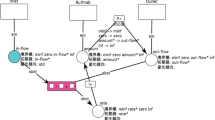Abstract
Many model-building learning environments (MBEs) have been developed to support students in acquiring the ability to build appropriate models of physical systems. However, they can’t explain how the simulated behavior of an erroneous model is unnatural. Additionally, they can’t create any feedback when the model is unsolvable. We introduce a MBE which overcomes these problems with two technical ideas: (1) robust simulator which analyzes the consistency of a model and relaxes some constraints if necessary, and (2) semantics of constraints which is a systematic description of physical meanings of constraints and provides heuristics for explaining the behavioral unnaturalness.
Access this chapter
Tax calculation will be finalised at checkout
Purchases are for personal use only
Similar content being viewed by others
References
Biswas, G., Schwartz, D., Bransford, J.: Technology Support for Complex Problem Solving - From SAD Environments to AI. In: Forbus, K.D., Feltovich, P.J. (eds.) Smart Machines in Education, pp. 72–97. AAAI Press (2001)
Bredeweg, B., Linnebank, F., Bouwer, A., Liem, J.: Garp3 — Workbench for qualitative modelling and simulation. Ecological Informatics 4(5-6), 263–281 (2009)
Forbus, K.D., de Kleer, J.: Building Problem Solvers. MIT Press (1993)
Forbus, K.D., Carney, K., Sherin, B., Ureel, L.: Qualitative modeling for middle-school students. In: Proc. of QR 2004 (2004)
Hirashima, T., Horiguchi, T., Kashihara, A., Toyoda, J.: Error-Based Simulation for Error-Visualization and Its Management. Int. J. of Artificial Intelligence in Education 9(1-2), 17–31 (1998)
Hirashima, T., Imai, I., Horiguchi, T., Toumoto, T.: Error-Based Simulation to Promote Awareness of Errors in Elementary Mechanics and Its Evaluation. In: Proc. of AIED 2009, pp. 409-416 (2009)
Author information
Authors and Affiliations
Editor information
Editors and Affiliations
Rights and permissions
Copyright information
© 2012 Springer-Verlag Berlin Heidelberg
About this paper
Cite this paper
Horiguchi, T., Hirashima, T., Forbus, K.D. (2012). A Model-Building Learning Environment with Explanatory Feedback to Erroneous Models. In: Cerri, S.A., Clancey, W.J., Papadourakis, G., Panourgia, K. (eds) Intelligent Tutoring Systems. ITS 2012. Lecture Notes in Computer Science, vol 7315. Springer, Berlin, Heidelberg. https://doi.org/10.1007/978-3-642-30950-2_90
Download citation
DOI: https://doi.org/10.1007/978-3-642-30950-2_90
Publisher Name: Springer, Berlin, Heidelberg
Print ISBN: 978-3-642-30949-6
Online ISBN: 978-3-642-30950-2
eBook Packages: Computer ScienceComputer Science (R0)




